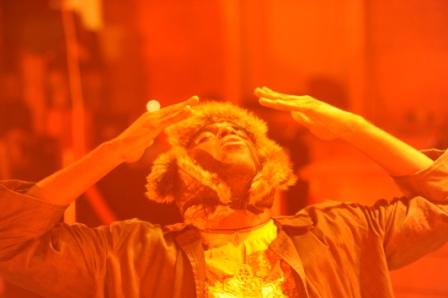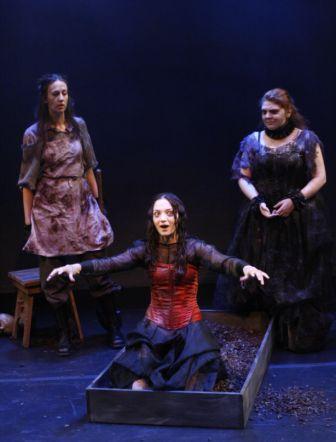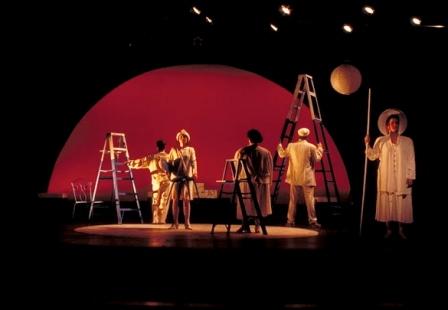|
JL: How long have you lived and worked as a playwright in DC? What brought you here? Why have you stayed?
JR: I grew up just outside the DC line, left town at 17, and then lived in a variety of interesting places for 20 years. For six years, I was Artistic Director of Company One Theater, a professional theater in Hartford, CT, that produced premieres by folks like Suzan-Lori Parks, Paula Vogel, Deborah Brevoort, Oana-Maria Hock, Rachel Sheinkin, Erik Ehn, John C. Russell, Elizabeth Egloff, Bridget Carpenter, Lisa Jones, and Donna diNovelli. When Company One went under (a sad story for another day), I ended up accepting an offer to develop and direct a brand new MFA in experimental theater at Towson University. I was planning to spend three years getting it up and running and then get back to my work. Eighteen years later, I’m still teaching at Towson, although I have since stepped down as director and dropped to half-time, in order to leave more time for my writing and directing. JL: Have you ever been a member of a DC area playwrights writing group? If so, did you find it useful? Would you recommend that other playwrights join them? JR: I’ve heard some great things about a number of writing groups in DC, and I think it’s fantastic that there are now so many! I’ve never belonged to a local writing group, per se. In addition to my teaching at Towson, I teach in a low residency MA/MFA creative writing program at Wilkes University, PA. Thirty-five writers show up twice a year to do readings at the residencies and talk about our work with each other, and some of us have gone away on writing retreats together, email work to each other, etc. And I have writer friends around the country, including dramaturg Mame Hunt, who have been very helpful in responding to my work - I hope I’ve been as helpful in responding to theirs! And of course my husband Chas Marsh, who is also my favorite composer, sound designer and video artist, is usually the first ear. I do recommend finding the right people with whom you can share your work, and I know that many people find a writing group invaluable. I think the best structure for that sharing may look different for each of us, and we often need different kinds of input at different times in our process. Especially in the early stages of writing, I think it’s important to have responders who share (or at least appreciate) your aesthetic, so your work doesn’t get derailed before you even know what it wants to be. JL: In DC, we have the Capital Fringe Festival, the Intersections Festival, the Source Festival, the Kennedy Center's Page-to-Stage Festival, the Black Theater Festival, and the Hip Hop Theatre Festival. We also have the Mead Lab at Flashpoint Theater Lab Program. Have you participated in any of these? If so, can you speak about your experience? JR: I’ve had my writing produced in the Source Festival three times, and just had a piece in the Cap Fringe this summer. Each time it was a very different kind of experience, but all basically good ones. Festivals have a certain frantic yet exhilarating energy, and they give artists a chance to try out different collaborations, which has certainly been useful and rewarding for me. I’ve met wonderful artists and incredibly hardworking and dedicated people in all aspects of the production process. JL: What kind of work do you do to pay the bills? How do you balance this work with your writing? JR: I was founding director of Towson University’s MFA in Theatre Program in 1994 and directed it for a dozen years. I continue to teach playwriting and new works development there and also teach in Wilkes University’s Creative Writing MA/MFA since consulting on its development in 2004. Teaching is my main money gig. I find it inspiring and satisfying, and I especially love the individual mentoring of the graduate school teaching experience, but universities seem to be learning all the wrong lessons from the business world. Let’s just say I find a contemplative practice essential to maintaining any semblance of a balance in university life. I may sometimes complain about teaching taking away from my writing time, but I don’t think that trying to rely on income from art-making would work for me in our culture, especially when you consider the commitment to self-promotion it takes these days. I don’t see that the free market supports creativity in any real way because it encourages the repetition of commercial success over the risk of experimentation: I’m amazed by the extraordinary artists who manage to continue to do brilliant work under those conditions. I feel for my students, and am horrified by the absurd rising costs of higher education that are making it harder and harder to let an artist’s education be about inquiry and experimentation. I worry about this a lot, how commodification undermines art in our society, and so I deeply appreciate having a job that allows me to create my work without focusing on how much income each individual project is going to provide. JL: How many plays have you had produced in the DC area? Were any of these plays self-produced? If so, where and what did you learn from that experience? JR: I’ve done much more of my work outside of DC than in it, both as a writer and as a director. Once I came back to the DC area, I was still trading more on my connections in other cities and didn’t really have time to build my DC connections back up when I was running the MFA at Towson. The down and dirty speed of putting work up in the Source and Cap Fringe Festivals was great in terms of helping me see what I need to rewrite – and several of those plays then got produced in their new forms, in other cities. I’m grateful to Maryland Ensemble Theatre in Frederick, who have offered to work on a new script I’m writing. If we’re counting Baltimore in the equation, I’ve had plays produced by Single Carrot, Iron Crow, The Acme Corporation, and The UnSaddest Factory. And I’ve directed productions at Everyman, Baltimore Theatre Project, Towson U and UMBC in Baltimore, and at Theatre of the First Amendment, Active Cultures (directing your lovely MAD BREED, Jackie!), Atlas, Source, and DCAC. Since the first 20 years of my career were primarily as a director, I’ve done a lot of producing. Company One was an Equity company, so we basically followed the regional theatre model, although we did some odd things like a live-broadcast radio series, a lunchtime theatre series, a museum tea-time reading series, and an opera. I try not to be the lead producer on projects any more, but I think that playwrights generally have a responsibility now to think of themselves as part of the producing team. Every theatre can use all the help we can give them to get the word out and audiences in the door. JL: If you could be produced at any theatre in DC, which would it be and why? JR: Other than the theatres I’ve known for decades, I try to visit a variety of theatres in DC, and I know better than to draw conclusions from having seen only a couple of plays at any given theatre. I must admit I don’t get down to DC nearly often enough to check out a full range over time of what’s being offered in so many of DC’s smaller theatres that often feature shorter runs. It’s still not easy to find theatres interested in work that deeply challenges conventional narrative structure. These days, the term “experimental” often refers to the physical performance style, the use of media, a devised development process, or challenging content. Those are all good, and I do all those things in my work, too. However, my personal favorite playground for shaking up our point of view is formal experimentation in language and structure, and that is still what scares theatres the most. These days, I’m especially interested in the DIY arts movement, both for its disregard of distinctions between disciplines and genres, and for its anti-consumerism. Baltimore has a lot going on in that scene, perhaps in part because there are a lot of young artists, filmmakers and musicians who stay in town after graduating from MICA, Towson, Hopkins or UMBC. They then start companies here with artists in the area or nearby cities, and tour work to NYC, Philly, DC or elsewhere: Wham City, Woof Nova, Missoula Oblongata, Kuumba Collective, EMP Collective, UnSaddest Factory, Single Carrot, Iron Crow, Nommo Theatre, Acme Corporation, Annex, Glass Mind, Copycat, In-Flight, DNA, White Flag; the Trans-Modern, Wordbridge and High Zero Festivals – now I’ll start getting in trouble for leaving out a lot of other good ones! Maybe we need an exchange program for playwrights, between the beltways: I encourage DC playwrights to look into the Baltimore scene, and I promise to head down 95 more often. JL: DC audiences are… JR: They seem to be getting more adventurous, I’m happy to say. And I love to see the different communities that get drawn to different theatres. JL: DC actors, designers and directors are… JR: It’s amazing to see how this community of artists has grown in both quantity and quality since I first directed in DC, more than 20 years ago. I think DC is as good a community of theatre artists as any city in the country. JL: DC critics… JR: The state of American theatre criticism, everywhere, is a big concern. I am still astonished to read so many reviews that talk about “the spine of the play,” “whose story is this?,” “what’s the central conflict?” and other semi-Aristotelian notions when a play is obviously exploring other approaches to narrative. Contemporary psychological theory is so much more interesting than the “character arcs” and pseudo-Freudian approaches of the 1950’s we still see some critics craving. It’s the critic’s job to help audiences see deeper into a play, not flatten it out. Sorry. Hot topic. DC is no worse than most places. Let’s move on, shall we? JL: How do you feel the DC theatre community has addressed the issues of race and gender parity ? How has this particular issue impacted you and your ability to get your work produced on the main stages? JR: Congrats on doing your part by writing this blog, Jackie! It seems that concerted activist efforts may have started to move things a bit in some quarters, although tokenism is still rampant. At my theatre in Hartford, when I was reading dozens of new plays every week, I found that many plays challenging conventional narrative, character, and structure, were often written by women, LGBT artists, and people outside the western European tradition. I think this formal expression of otherness still stops some of our most exciting writers from getting produced outside New York City. JL: What advice do you have for an up and coming DC based playwright or a playwright who has just moved to D.C.? JR: Take advantage of DC’s incredible wealth of resources, from festivals to writing groups to small theatres. But don’t get stuck in your own city limits: check out Baltimore and Philly and NYC - and Montreal and Moscow, for that matter. I notice that many cities (including my adopted home here in B’more) can get a little claustrophobic, artistically. We need to keep the communication open between the cities as well as in our own communities. And maybe most important: take care of yourself. Find time to get a little nature on you, meditate, step away from the keyboard. Don’t focus on your career in art, focus on your life in art. JL: What's next for you as a playwright? Where can we keep up with your work? JR: My script for THE CIRCLE, Banished? Production’s site-specific audio play that Carmen Wong just directed for the Cap Fringe, is being remounted at Dupont Circle 9/26 to 10/7: www.banishedproductions.org I’m directing Jordan Harrison’s ACT A LADY at Iron Crow, Baltimore Theatre Project, May 2013, which should be a blast: www.ironcrowtheatre.com I’m working with Cincinnati composer Douglas Knehans, writing a libretto for BACKWARDS FROM WINTER: an opera for soprano, electric cello and video that we should be getting into the recording studio by early 2013. I'm writing the libretto and directing an opera for soprano and electric cello with composer Douglas Knehans (2013). And in the category of how to keep sane and creative, I taught a workshop on meditation and playwriting this summer at the KO Festival of Performance, and look forward to continuing this exploration of the connection between contemplative practice and artistic process: http://kofest.com/playwriting_workshop/ I announce projects through my facebook page, so friend me for updates, and my website is www.juanitarockwell.com
0 Comments
Your comment will be posted after it is approved.
Leave a Reply. |
My BlogI'm a playwright, dramaturg, and teaching artist. It is here where you'll find my queries and musings on life, theater and the world. My posts advocate for diversity, inclusion, and equity in the American Theatre and updates on my own work. Please enjoy!
Categories
All
Archives
June 2020
Reading List
|



